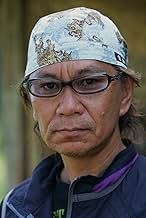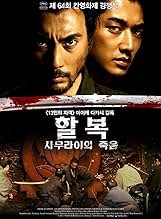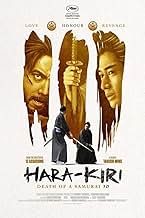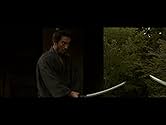Eine Geschichte über Rache, Ehre und Schande, in deren Zentrum ein Samurai steht, der das Schicksal seines Ronin-Schwiegersohns entdeckt und damit einen spannungsgeladenen Showdown der Rache... Alles lesenEine Geschichte über Rache, Ehre und Schande, in deren Zentrum ein Samurai steht, der das Schicksal seines Ronin-Schwiegersohns entdeckt und damit einen spannungsgeladenen Showdown der Rache gegen das Haus eines Feudalherrn in Gang setzt.Eine Geschichte über Rache, Ehre und Schande, in deren Zentrum ein Samurai steht, der das Schicksal seines Ronin-Schwiegersohns entdeckt und damit einen spannungsgeladenen Showdown der Rache gegen das Haus eines Feudalherrn in Gang setzt.
- Regie
- Drehbuch
- Hauptbesetzung
- Auszeichnungen
- 6 Nominierungen insgesamt
- Motome Chijiiwa
- (as Eita)
- Priest
- (as Goro Daimon)
Empfohlene Bewertungen
Kobayashi's hard hitting "Harakiri" is a masterpiece. It's one of the great pieces of not only Japanese cinema, but also one of the best movies of the 20th century. While I'm disappointed the film was remade at all, and surprised it came from Miike, there are still good things to be found here. To my surprise, for the most part, this is a good movie and in very small quantities, there are some true moments of greatness. Even if they are very short.
A good deal of the original film's grit is lost for most of this go around. The cinematography is over-lit and the pacing falls into lulls. But survive to the end and you will be rewarded as the final irony is quite powerful. I mean, no spoilers from me, but even with the cheesy fake snow, I have to say, Ebizô Ichikawa's powerful presence won me over and he truly wins the day when the time calls for it.
I was never too crazy about all the Kurosawa remakes of the 60s and 70s. Fistful of Dollars always felt like a cheap knock-off, because it is. The Magnificent Seven was sort of a tolerable chuckle. Kurosawa's films were so human, almost populist, because of their themes, his work was ripe for remake, reboot or even plagiarism. Only Star Wars seemed to get the joke and succeed in being something different than a pure Hidden Fortress copy. Kobayashi's Harakiri seemed to escape the trend for so long because of the subject matter - even the title! But here we are. There is still something not right about this "remake," but MIike gets it right in the end, even if never needed to be done in the first place.
Through a series of events told partially in flashbacks, Hara-Kiri poses the question of how relevant our values are -- whether they be highly codified values like honour or the more nebulous instincts that guide us today -- in the face of human suffering. The ronin that we see humiliated and killed in the first act is not guilty of breaking some arcane samurai bylaw but of doing something most of us would find disgraceful. But as the film goes on it argues that we should hold compassion even for people such as this, and that honour is ultimately irrelevant in the face of social suffering. In an age of recession and austerity, where so many try to cling to their ideas of what they or other people "deserve", this is an important message.
It's an easy film to appreciate and a difficult one to love -- there's a kind of coldness to this set of Miike's movies that seems out of place with the gonzo enthusiasm of his earlier work. And doubtlessly it will be too slow and cerebral for some. But its critique of not just a canonized genre but the way in which we view ethics makes it well worth seeing.
Ironically Miike's film also carries over Kobayashi's one serious flaw - - an overindulgence in sentimentality and pathos in the flashback love story.
Miike, apparently seeking 'respectability' after all his entertaining ultra-violence with this staid remake/adaptation, also overdoes everything. He makes every scene too drawn-out and talky. He further overdoes the sentimentality, to the point that in his version becomes unbearably cloying, virtually unwatchable. Once again, 3D adds nothing; black and white was just what was needed. Less was and is more.
Whenever a filmmaker goes over familiar ground, adapting a book that has been adapted (and very well) before, he exposes himself to comparisons to the book and to the previous adaptation. Don't get me wrong. Miike has plenty of skill. It is not that his 'Hara- Kiri' is a washout. It's just that Kobayashi's version is a true work of art, a film classic, in fact; and in comparison Miike's is merely a competent effort and a pointless bid for respectability that was not needed. He is a master in his own realm. Surprisingly his last film before this, the juicy, action-historical blockbuster 13 Assassins, which I thoroughly enjoyed, also was an adaptation -- of Eiichi Kudo's little known samurai film of the same name. Thanks to 'Wildgrounds' (who compare the two Hara- Kiri films) for this info. Thanks also to Ben Parker on 'CapitalNewYork' for his detailed comparison of the two films; and to the Criterion Collection, for its print of Kobayashi's 'Hara-Kiri' and Donald Ritchie's informed introduction to it.
Wusstest du schon
- WissenswertesThe first 3D title ever to be shown in official selection at the Cannes Film Festival.
- PatzerAs the wooden wakizashi is pushed into the stomach (after the tip snapped off), you can see that the blade is sliding into the handle.
- Zitate
Hanshirô Tsugumo: A warrior's honor is not something simply worn for show!
- VerbindungenFeatured in At the Movies: Cannes Film Festival 2011 (2011)
Top-Auswahl
- How long is Hara-Kiri: Death of a Samurai?Powered by Alexa
Details
- Erscheinungsdatum
- Herkunftsländer
- Offizielle Standorte
- Sprache
- Auch bekannt als
- Hara-Kiri: Death of a Samurai
- Produktionsfirmen
- Weitere beteiligte Unternehmen bei IMDbPro anzeigen
Box Office
- Bruttoertrag in den USA und Kanada
- 75.688 $
- Eröffnungswochenende in den USA und in Kanada
- 10.920 $
- 22. Juli 2012
- Weltweiter Bruttoertrag
- 5.435.358 $
- Laufzeit
- 2 Std. 8 Min.(128 min)
- Farbe
- Sound-Mix
- Seitenverhältnis
- 2.35 : 1



















